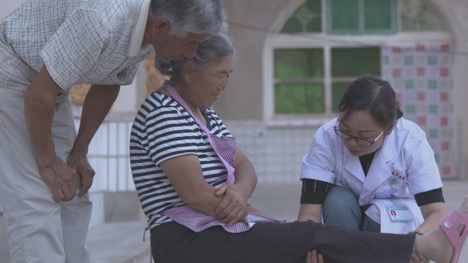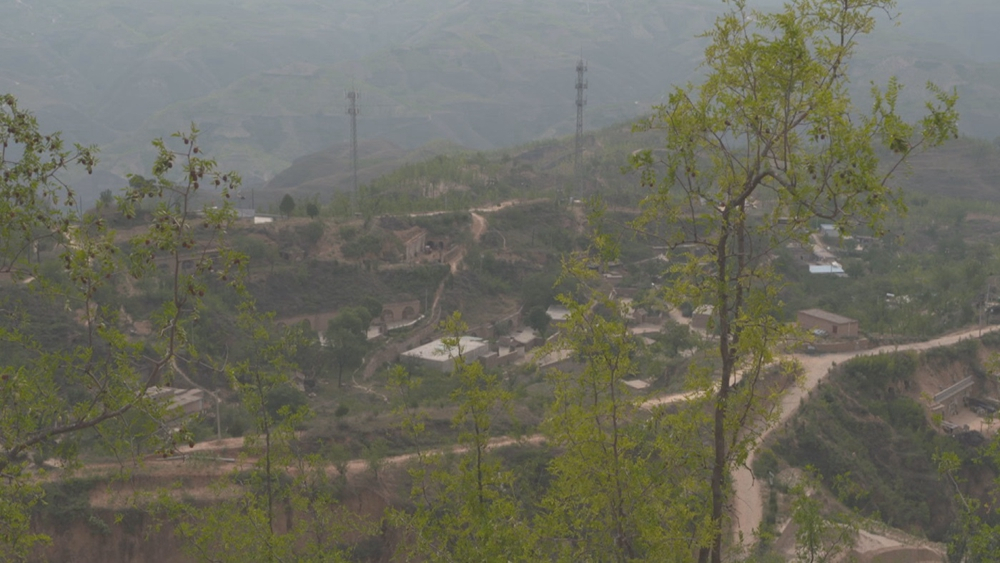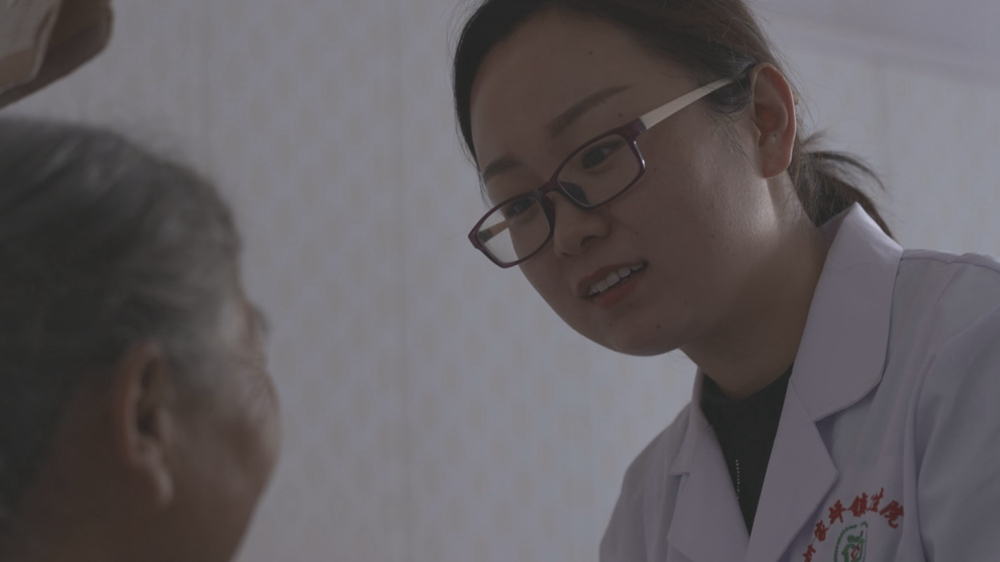02:53

Located in Qingjian County, Shaanxi Province, Majiacha is a designated "poor village." Here, people live below the poverty line, and the elderly accounts for most of the population. People living in this village are more susceptible to illnesses, which can quickly cripple them financially.
Xu Jing is 29 years old. She completed her three-year medical education at the Health Science Center, Shaanxi Energy Institute. After one year of professional training and four years of medical internship, she came to Majiacha on her own in 2017 to serve as the village doctor.
"During my childhood, I lived in the countryside with my grandparents. Whenever we got sick, the health center in the township was the only option," she recounted.
"During that time high blood pressure was not taken as a serious issue by the rural residents. They didn't know that the symptoms must be treated with medication for one's entire life, and that their diet must be well-controlled. Without proper advice from a doctor, they opted to take pills to quench the symptoms only when dizziness came, but stopped taking their medicine when they seemingly felt good.
"That was true of my grandma," Xu said. "Financially struggling, at that time my family was unable to afford the basic medical costs, such that my grandma's disease became steadily worse, then chronic, until one day she died of a cerebral hemorrhage," said Xu as she choked back tears. And "from then on, I have been determined to be a doctor, with the hope of making access to health care available for people with no money," she said.
She has remained in Majiacha for three years, without leaving even once.
"Upon my first arrival, I saw people's eyes were filled with enthusiasm. After that, I made up my mind: Though the medical support structures were not well established in the village — I could practice my medical skills there to win the people's trust," Xu said.
Majiacha villagers are generally conservative with traditional thinking. When unwell, they often resort to superstition, perhaps a traditional prescription, or even let their illness persist until it worsens and their illness proves fatal.
In the village, there are 100 elderly people over 65 years old, of which 26 people are diagnosed with chronic diseases, 10 with high blood pressure, four with diabetes, and one with a serious illness.
After learning the basic medical condition of the village, Xu got down to a door-to-door visiting schedule, issued a health education brochure, gave out a chronic disease prevention manual, and established a WeChat group for medical education.
Xu visits them, one after another — measuring blood pressure and blood sugar among other things. She also undertakes other responsibilities like file management of residents' health history, prevention of infectious diseases, health education, contract-signing with family doctors, and quarterly follow-up of chronic diseases. The work of the rural cooperative medical care is also carried out under her guidance.

A view of Majiacha Village, Shaanxi Province. /CGTN Photo
A view of Majiacha Village, Shaanxi Province. /CGTN Photo
Those who are of advanced age and live alone in the village will receive special care.
This year, a villager named Ma Cang turns 78 years old. His wife died early in his life, and his only daughter got married and moved far away. His home became an empty nest. Moreover, he has high blood pressure and is paralyzed to the extent that he is barely able to look after himself. For that reason, Xu visits him often. There, she will measure Ma's blood pressure and provide advise him on taking his medication. Xu also helps him sweep the house and cheers him up with chit-chat and family-like care.
"Establishing written health records and providing regular physical examinations are especially important for the villagers," she added. In order to get through the last trench of the 'Poverty Alleviation in Health Care' initiative — and to effectively prevent the people from being reduced to, or returning to poverty due to illness — Xu Jing with the 123 poverty-stricken villagers signed a service contract. The document provides full medical coverage for the village. Since every resident signed the contract, she has become the 'family doctor' of the entire village.
Occasionally, Xu Jing would walk across the stone bridge near the road, climb the hillside and visit a villager named Wang Bimei.
"I still remember my first visit," Xu recounted, adding that "on that square bed laid a body of sickness, as if it were strapped by chains, with the last breath remaining in her mouth."
Xu began to measure Wang's blood pressure, asked about her eating habits, took inventory of her medications, talked about exercise and other symptoms in detail. Upon returning to Wang's home the next time, the doctor had developed three plans for Wang's recovery, with her husband's involvement.
First, observe the changes of Wang's health condition every day and ensure Wang's salt intake did not exceed four to six grams per day.
Second, brighten Wang's mental and emotional attitude, talk with her about pleasant things, and helping her avoid irritation.
Third, accompany her for a walk; prevent lying in bed for long periods of time.

Xu Jing talks with an old woman. /CGTN Photo
Xu Jing talks with an old woman. /CGTN Photo
The doctor's next follow-up visit would come in less than three days intervals each time.
After about a month of implementing Wang's recovery plan, she could get up and cook, and manage to take care of herself.
At the sight of the couple's grateful eyes, Xu Jing was deeply touched. She felt that all her efforts were worth it.
"To be a good doctor, one should, of course, have good medical skills. But it takes more than that. One must also own noble ethics within one's self. In my career, I have always put ethics-building in first place; even ahead of practicing medicine," she went on to say.
"The village clinic is aimed at the masses of local people, especially those elderly and poor people who have been left behind. In my clinic, I have implemented a regulated pricing structure of 'reduction, mitigation, and exemption' for the benefit of the people," Xu explained.
"And for villagers with financial difficulties, and patients who do not bring sufficient money, at the time they can take their medicine and be treated first. For those household that are specified as poor, we provide free medical treatment. For those who go to see the doctor in big hospitals, I will, without exception, also go to the various hospital units to help my patients with reimbursement, and strive to make the reimbursement ratio meet the expected threshold of 85 percent. In that way the interests of the people can be maximized so that they can feel the warmth from the government," She said.
Xu Jing's devotion to village health has become well known by all the villagers. People trust her and like her. In September 2019, officials of the National Health Commission of the People's Republic of China went on a field trip to Qingjian County. During that time, the commission gave high praise to Xu.
But her journey is not a bed of roses. During her stay in Majiacha, Xu met with numerous difficulties. The lack of available medication is a major concern. Basic drugs like cold remedies are sufficiently in stock, but some of the more vital medicine, such as those used to treat diabetes and cancer are, in most cases, not available. "At least 80 percent of medical costs are said to be covered by the government, but if the drugs needed to be provided in time for the patients are inaccessible, then treatment is just empty talk without consideration of the costs," she said. Xu has brought this up to the relevant departments several times, but in most cases there was no support.
Next, is inconvenient transportation since there are no trains or subways to speak of. Roads paved with gravel and rocks are perilously winding and bumpy. The doctor lives in a house five miles from the village and takes the old local bus to work very early each morning, then continues the rest of her house calls down the road on foot. Such a schedule stretches into a long working day, whereas the time spent with her only son is considerably squeezed. "I cannot even remember when it was that I took my son to the amusement park," she added.
Friends of the doctor who are working more comfortably in downtown city offices have asked her why she is willing to stay in that small, poor village remotely in the mountains.
As she put it: "The Majiacha villagers need me. The building of primary medical care needs me. If the villagers recover from illness, I believe that my own true value is realized."
At the forefront of poverty alleviation is healthcare, however, doctor Xu is never alone.
Mountains, rivers, deserts or fields — where there is disease and poverty, village doctors are fighting alongside her.